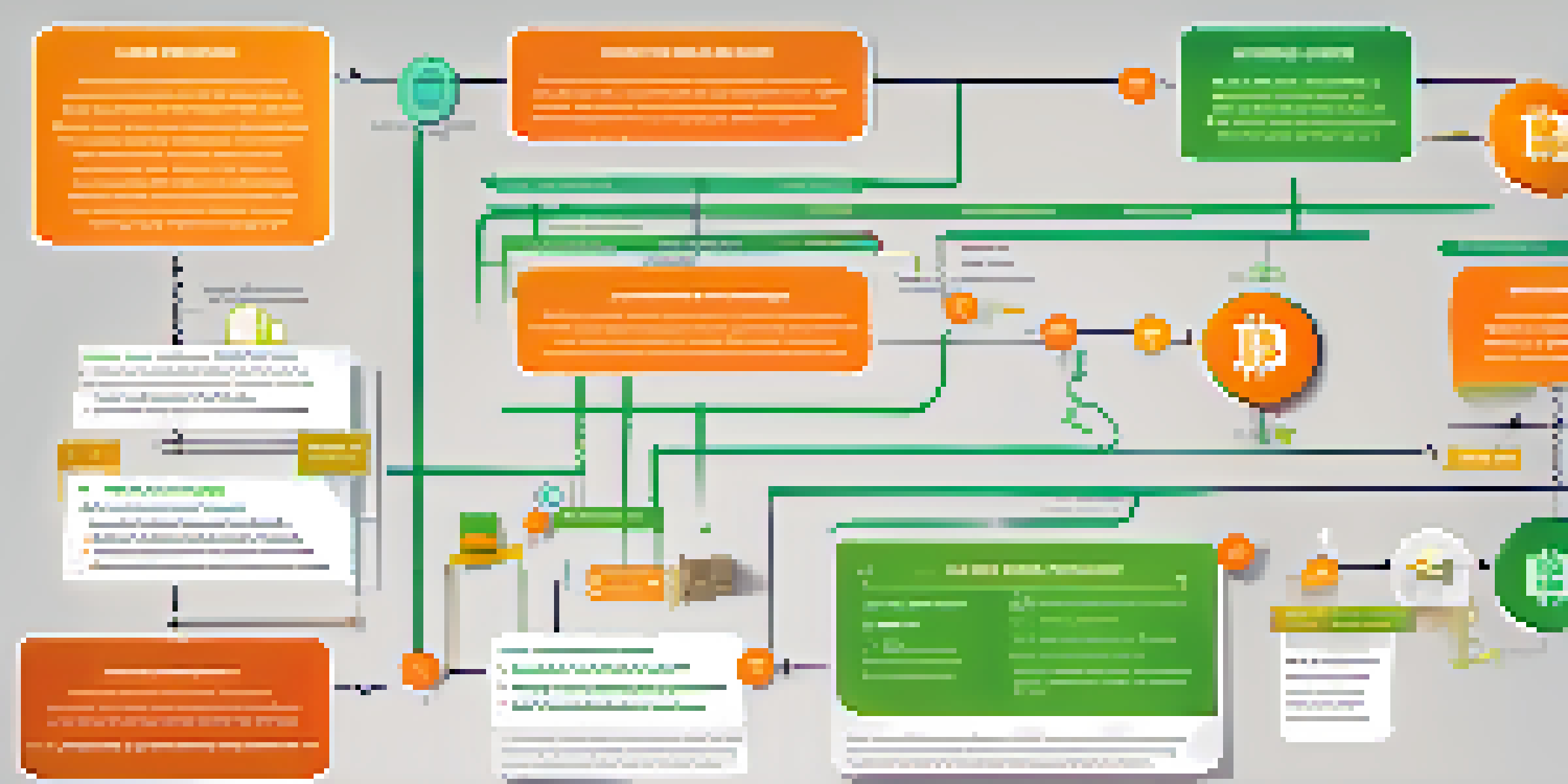Bitcoin: A Transparent Solution for Charitable Donations

Understanding Bitcoin and Its Core Features
Bitcoin is a decentralized digital currency that operates on blockchain technology. This means it is not controlled by any central authority, making transactions secure and transparent. Each transaction is recorded on a public ledger, which can be accessed by anyone, enhancing accountability.
Bitcoin is a technological tour de force.
One of the key features of Bitcoin is its transparency. Unlike traditional donations, where funds can sometimes be misallocated or lost in administrative costs, Bitcoin transactions are traceable. Donors can see exactly where their contributions go, fostering trust between charities and their supporters.
Furthermore, Bitcoin allows for lower transaction fees compared to traditional payment methods. This means that more of each dollar donated can go directly to the cause, maximizing the impact of charitable contributions. It's a win-win situation for both donors and charities.
The Benefits of Using Bitcoin for Donations
Using Bitcoin for charitable donations comes with several advantages. First and foremost is the enhanced security it offers. Transactions are encrypted, making it difficult for fraudsters to intercept funds. This level of security is crucial for organizations handling sensitive financial information.

Additionally, Bitcoin transactions can be completed quickly, often within minutes. This speed can be a game-changer for charities that need to access funds immediately to address urgent needs, such as disaster relief efforts. The promptness of Bitcoin can significantly improve operational efficiency.
Bitcoin Enhances Donation Transparency
Bitcoin transactions are recorded on a public ledger, allowing donors to track their contributions and fostering trust with charities.
Moreover, Bitcoin donations can reach global audiences without the hassle of currency conversion or international banking fees. This opens up avenues for nonprofits to attract supporters worldwide, broadening their funding base and creating a more diverse donor community.
Case Studies: Successful Charities Using Bitcoin
Several charities have successfully integrated Bitcoin into their donation processes, leading to increased transparency and donor trust. For instance, the Pineapple Fund, created by an anonymous Bitcoin millionaire, donated millions to various causes, showcasing how Bitcoin can facilitate large-scale giving.
The future of money is digital currency.
Another example is the Water Project, which uses Bitcoin donations to fund clean water initiatives in Africa. By accepting Bitcoin, they not only attract tech-savvy donors but also ensure that funds are used directly for projects, as donors can track their contributions on the blockchain.
These case studies highlight the transformative potential of Bitcoin in the charitable sector. They illustrate how innovative approaches can enhance the effectiveness of donations, encouraging other organizations to explore similar models.
Challenges of Bitcoin in Charitable Donations
While Bitcoin offers numerous benefits, it also faces challenges that charities must navigate. One significant hurdle is the volatility of Bitcoin's value. The price can fluctuate dramatically, which can affect the total amount received by charities if donations are not converted to fiat currency promptly.
Additionally, some potential donors may feel apprehensive about using Bitcoin due to a lack of understanding or general skepticism about cryptocurrencies. Charities need to invest in educational resources that explain how Bitcoin works and its benefits for charitable giving.
Security in Bitcoin Donations
The encryption of Bitcoin transactions provides a high level of security, reducing the risk of fraud for both donors and charities.
Regulatory concerns also pose a challenge. As governments worldwide develop new regulations regarding cryptocurrencies, charities must remain compliant to avoid legal issues. This can be daunting for organizations that may not have the resources to keep up with rapidly changing laws.
How to Get Started with Bitcoin Donations
For charities looking to embrace Bitcoin, the first step is to set up a digital wallet. This wallet will allow organizations to send and receive Bitcoin securely. There are various wallet options available, and choosing one that suits the charity's needs is crucial for effective management.
Next, charities should educate their supporters about the benefits of donating Bitcoin. This could include creating informative content on their websites and engaging with their donor base through social media to raise awareness.
Finally, providing clear instructions on how to donate using Bitcoin will make the process seamless for potential donors. By simplifying the donation experience, organizations can encourage more people to contribute and support their causes.
The Future of Bitcoin in Charitable Giving
As more people become familiar with cryptocurrencies, the future of Bitcoin in charitable donations looks promising. With increased adoption, we’ll likely see a growth in the number of charities accepting Bitcoin, leading to greater transparency and efficiency in the sector.
Moreover, advancements in blockchain technology may further enhance the features of Bitcoin donations. Innovations such as smart contracts could automate fundraising processes, ensuring funds are released only when specific conditions are met, which adds another layer of trust.
Global Reach Without Barriers
Using Bitcoin for donations allows charities to attract international supporters without the complications of currency conversion or banking fees.
Overall, as society continues to embrace digital currencies, Bitcoin may revolutionize how we think about charitable giving. By promoting transparency and efficiency, it has the potential to create a more trustworthy and impactful philanthropic environment.
Encouraging Trust Through Transparency
One of the most compelling reasons to use Bitcoin for donations is the transparency it brings. Donors today are increasingly concerned about how their money is used, and Bitcoin provides a clear view of the donation journey. With every transaction recorded on the blockchain, donors can track their contributions in real-time.
This level of transparency not only reassures donors but also encourages charities to operate more ethically. Knowing that their transactions are publicly accessible may prompt organizations to be more diligent in their financial practices, ultimately benefiting the causes they support.

As a result, charities that adopt Bitcoin could foster stronger relationships with their supporters. The commitment to transparency can lead to increased donor loyalty, as supporters feel more connected to the organizations they choose to help.